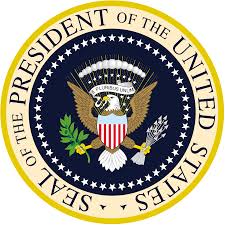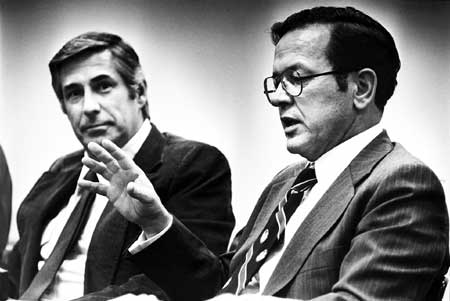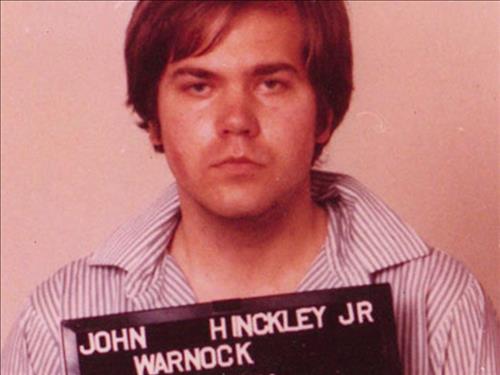The Rhodes Cabinet and Staff
President James A. Rhodes (OH, Moderate Republican, Realpolitik)
Re-elected in a landslide, Rhodes has moved away from the moderate conservatism of his governorship and first term into an agenda of guaranteed employment, with his self-styled Jobs For America program. Having stalled on his cuts to the Johnson and McCarthy-era social spending programs during his first term, it remains to be seen exactly how much of the Great(er) Society Rhodes will dismantle if he can implement Jobs For America.
Vice President Paul Laxalt (NV, Conservative Republican, Hawk)
In a spectacular upset, Nevada Senator Paul Laxalt rose to the Vice Presidency to replace Mills Godwin. A previous supporter of the presidential runs of Ronald Reagan, and Barry Goldwater before him, Laxalt is a fiscal conservative who believes in strong opposition to the Soviet Union. However, Laxalt has fully embraced guaranteed employment as part of becoming Vice President, more so than most other conservative Republicans.
Secretary of State Richard Nixon (CA, Moderate Republican, Realpolitik)
With Rhodes' complete disinterest in foreign policy, Nixon has slipped the leash of presidential oversight to take control of America's international affairs. Having rebuilt and rearmed the world's anti-Communist dictatorships after eight years of McCarthy's attempted democratization initiatives, American power projection has grown exponentially, but at the cost of thousands of cases of human rights abuses. Nixon's greatest success has been opening relations with the People's Republic of China, while his greatest challenge will be his planned invasion and toppling of Iran's Islamic Socialist government through his proxies in the Iraqi and Afghan governments.
Secretary of Treasury Claude R. Kirk Jr. (FL, Conservative Republican, Hawk)
Previously serving as Secretary of Commerce, Kirk has been moved up to the Treasury Department to replace the late Nelson Rockefeller. Kirk has been one of the greatest beneficiaries of Rhodes' largess towards his friends, and has been directly involved in trying to implement some of Rhodes' more outlandish projects, such as the Ohio-Ontario Great Lake Bridge.
Secretary of Defense Alexander Haig (PA, Conservative Republican, Hawk)
Haig has seen a meteoric rise since the election of Jim Rhodes, from relatively unknown general, to US Army Chief of Staff, to Secretary of Defense. Replacing Barry Goldwater, Haig is much more deferential to Nixon on foreign policy matters, and has also adopted most of Rhodes' domestic policies, namely guaranteed employment. Haig's appointment indicates a greater accumulation of power around Rhodes and Nixon loyalists in the White House.
Attorney General Bill Saxbe (OH, Moderate Republican, Dove-Leaning)
One of the least attention-grabbing figures of Rhodes' cabinet, Bill Saxbe has served quietly, efficiently, and loyally as Attorney General. Saxbe has been charged with clearing any possible legal challenges towards Jobs For America, as well as implementing Rhodes' War on Drugs. A staunch supporter of trust-busting, Saxbe has taken to the War with gusto to crack down on pharmaceutical giants, but has raised concerns on the disproportionate arrests and incarcerations the War has had on low-income and African American households on the street level.
Secretary of the Interior Don Samuelson (ID, Conservative Republican, Hawk)
A move further towards land development, former Governor of Idaho Don Samuelson succeeded the compromise pick of Clifford Hansen as the Secretary of the Interior. Samuelson was most well known as Governor of Idaho for losing re-election due to his support of widespread molybdenum mining in the state. With Rhodes' fossil fuel policies letting America get through the Oil Crisis relatively unscathed, Samuelson represents Rhodes' intention to ignore the environmentalism movement even more than he already has been.
Secretary of Agriculture William R. Poage (TX, Conservative Democrat, Hawk)
Poage continues to serve as the Secretary of Agriculture as Rhodes' reminder to the Democrats that he'll promote their conservatives if given the opportunity. Poage has worked with the the President and the Department of the Interior for Rhodes' internal resource development programs. While Poage has continued the Ever-Normal Granary agricultural policy in place since the 1930s, he has also pressed for the establishment of large acreage factory farms.
Secretary of Commerce Dave Thomas (OH, Conservative Independent, Realpolitik)
The founder of the Wendy's fast food burger chain was appointed by his friend Jim Rhodes to serve on the National Economic Council. After the death of Treasury Secretary Nelson Rockefeller, the former Commerce Secretary, Claude R. Kirk Jr, was moved in to Rockefeller's position. In turn, Thomas was moved up from the National Economic Council to the position of Secretary of Commerce. Although willing to work with the President, Thomas is becoming nervous of the slow decline of Wendy's in his absence as its business leader.
Secretary of Labor Jacob Javits (NY, Rockefeller Republican, Dove)
One of the last of the liberal Republicans still active in politics, Jacob Javits continues to serve as Secretary of Labor, despite his declining health. Javits' diagnosis with ALS has begun to limit his potential, but remains in place, for the most part, due to his support for Jobs For America, albeit from a more left wing point of view than is typical for a Republican.
Secretary of Health, Education, and Welfare Robert H. Michel (IL, Conservative Republican, Hawk)
Rhodes' chief hatchet man when it comes to government spending, Michel is considered the most unpopular member of Rhodes' cabinet, and that's just how Rhodes likes it. Acting as a lightning rod for much of the bad publicity that comes with cutting social security, Michel has been kept on as the man America loves to hate, and to distract from the fact that Rhodes was ultimately responsible for the cuts.
Secretary of Housing and Urban Development Charles H. Percy (IL, Rockefeller Republican, Dove-Leaning)
Although Charles H. Percy has served admirably as Secretary of Housing, his informal agreement with Rhodes to be involved in foreign policy decision-making has largely been forgotten. Although Rhodes still forces Nixon to listen to Percy's advice, Rhodes doesn't stick around long enough to see that any of Percy's suggestions are actually implemented.
Secretary of Transportation Ray Lee Hunt (TX, Conservative Republican, Hawk)
Working with Agriculture and the Interior to implement Rhodes' vision of industrial development and energy independence, Ray Lee Hunt, the heir to Hunt Oil, remains as Rhodes' most direct link to the fossil fuel industry. Where Rhodes and Hunt disagree is Rhodes' tolerance of government regulations and powerful unions in the transportation industry, most notably the Teamsters.
Secretary of Employment Hyman Minsky (MO, Moderate Independent, Realpolitik)
President Rhodes' chief economic adviser has been appointed to head the new cabinet position of Secretary of Employment. The original inspiration for Rhodes' ideas of guaranteed employment, Minsky has now been tasked with practically implementing the idea in anticipation of the passage of the
Jobs For America Act. After the program is established, Minsky is expected to determine exactly what sort of work will be made available, and for what wages. Rhodes' longtime financial advisor Richard Krabach has been appointed as Deputy Secretary of Employment.
------------------------------------------------------------------
Supreme Allied Commander Europe Bernard W. Rogers (KS, Moderate Independent, Hawk)
Bernard Rogers continues to serve as the Supreme Allied Commander Europe. While popular with American troops abroad, Rogers has had difficulty with readjusting America's European allies, who had grown comfortable with the loose hand the McCarthy Administration had taken with European defence.
Director of the Federal Bureau of Investigations Mark Felt (DC, Conservative Independent, Hawk)
The Assistant Director and replacement of McCarthy appointee Hale Boggs, Mark Felt has fully taken advantage of Rhodes' rollback of investigations into the conduct of America's security agencies. While commended by some as an honest American patriot, Felt's critics claim that he's used Rhodes' rollbacks to cover up civil liberty violations.
------------------------------------------------------------------
First Lady Helen Rhodes
Helen Rhodes was never comfortable in the spotlight. She rarely appeared on the campaign trails of Ohio with her husband, and remains entirely disinterested in politics despite being First Lady. Although an excellent host of events at the White House, Helen has remained at arms-length from the Washington social scene.
White House Chief of Staff Tom Moyer (OH, Moderate Republican, Realpolitik)
Moyer had barely served a year as Rhodes' Chief of Staff before the Ohio Governor was elected President, but has since come into his own in the position. Moyer's efforts to keep an organized office have largely been foiled by Rhodes' disregard for keeping a strict schedule, but he has otherwise worked effectively.
White House Senior Advisor Earl Barnes (OH, Moderate Republican, Realpolitik)
Barnes, having served on Rhodes staff for over a decade, remains the President's closest advisor, although often Rhodes simply bounces ideas off of him. Earl Barnes continues to work with Roy Martin, the head of Rhodes' patronage machine, who is working at a much higher level than Ohio state politics.
White House Deputy Advisor Robert Hughes (OH, Moderate Republican, Realpolitik)
The former Chairman of the Republican Party of Cuyahoga County, Ohio, Hughes continues to serve as one of Rhodes' advisors.
White House Deputy Advisor Fred Neuenschwander (OH, Moderate Republican, Realpolitik)
Fred Neuenschwander, the former Ohio Development Director, informally operates as the handler for Rhodes' various eccentric projects, working most closely with Secretary of Treasury Claude R. Kirk Jr.
White House Press Secretary James Duerk (OH, Moderate Republican, Realpolitik)
Working for Rhodes since their Ohio days, Duerk continues to serve as Rhodes' Press Secretary.
White House Chief Speechwriter Rollin Jauchius (OH, Moderate Republican, Realpolitik)
The former journalist for the Columbus Evening Dispatch continues to serve as Rhodes' Chief Speechwriter, when Rhodes isn't going off script with such debacles as the Ohio Rant.
Director of the National Economic Council William Scranton (PA, Rockefeller Republican, Hawk)
The former Governor of Pennsylvania has continued on as Director of the National Economic Council from Rhodes' first term. Although Dave Thomas has been moved up to the Commerce Department, Scranton continues to work with Rhodes' Ohio business partners, Don Hilliker and Ralph Stolle.
National Security Advisor Henry Kissinger (NY, Rockefeller Republican, Realpolitik)
Working closely with Richard Nixon, National Security Advisor Henry Kissinger effectively marginalized Barry Goldwater and Charles Percy from foreign policy decision-making. Remaining Nixon's close partner in foreign policy matters, he is now working with the much more co-operative Alexander Haig in the Defence Department.
Chairman of the Young Republican National Federation Bill Willis (OH, Moderate Republican, Realpolitik)
Rhodes' youth organizer from Ohio continues to serve as Chairman of the Young Republicans.
Director of the Environmental Conservation Agency James G. Watt (WY, Conservative Republican, Hawk)
Rhodes has refused to back down on the matter of the highly controversial James G. Watt, keeping him for four rocky years as the head of the ECA. Watt is almost universally despised by his own agency, having effectively gutted its effectiveness to make way for Rhodes environmentally catastrophic resource development programs.
United States Ambassador to the United Nations Walter J. Stoessel Jr. (KS, Moderate Independent, Realpolitik)
The former Ambassador to West Germany, Poland, and the Soviet Union, as well as the Assistant Secretary of State for European Affairs, Stoessel has been appointed due to his role in opening relations with the People's Republic of China, and will continue to work with China as they take the UN seat of the Republic of China.




